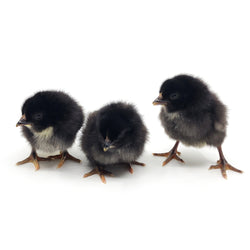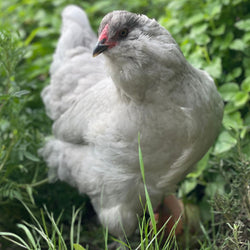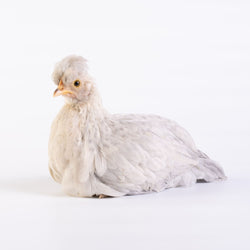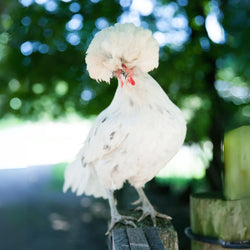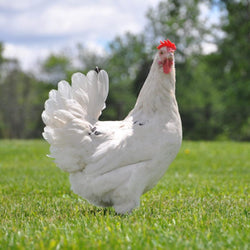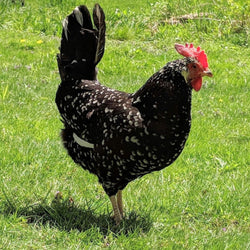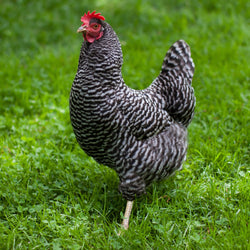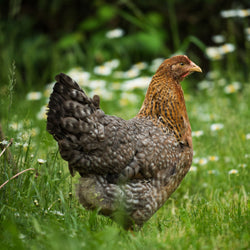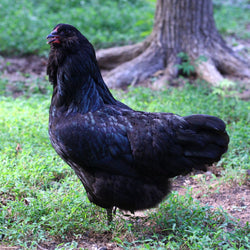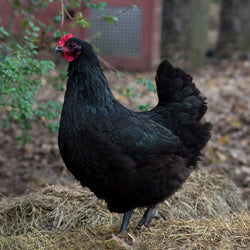page=2/--
Frequently Asked Questions
Here we answer the most commonly-asked questions about ordering, chicken care, and more.
What do I need to know about ordering fertile hatching eggs from My Pet Chicken?
My Pet Chicken absolutely guarantees that the fertile hatching eggs you order from us will arrive intact and ready for incubation. Hatching egg orders may ship any day of your selected shipping week, Monday through Saturday via USPS Priority Mail. If any eggs for which you have paid arrive cracked or broken, contact us within two business days of receiving them with photos of the damage. - IMPORTANT: Receiving unbroken eggs is NOT a guarantee that they will all hatch. Why? Let us tell you BEFORE you make your purchase so you can be informed. Our eggs are gathered daily and stored...
Read MoreWhy are my chickens' egg whites cloudy?
Cloudy whites in a farm egg are usually indicative of its freshness. The cloudiness is caused by dissolved carbon dioxide in the white, which eventually escapes through the shell in older eggs. If the white of the egg is greenish, that usually means there is too much riboflavin in the diet. Make sure they are getting balanced nutrition. Eating acorns, shepherds purse or some types of weeds can cause that greenish tinge, too. Pinkish whites are caused by some types of weeds a chicken may get into, or high quantities of cottonseed meal in the diet.
Read MoreWhy are the whites of my chickens' eggs watery?
Usually the whites of very fresh eggs such as you may gather from your own flock will be very thick in comparison to what you may be used to seeing at the grocery store! However, watery whites can be caused by a number of things. Eggs that are old will have watery whites (this is usually why grocery store eggs are so thin and tasteless). High ammonia levels in the coop can cause watery whites, too, as can high temperatures. These are other reasons factory farmed eggs are usually not very good: the conditions chickens experience in places like that...
Read MoreWhy did my chicken lay a shell-less egg?
A shell-less egg is a strange sight! You might think a shell-less egg would look like a cracked egg: a mess of white and yolk soaking into nesting material. But actually, an egg without a shell is often intact. Even an egg without a shell has that soft membrane. You might even think it's a regular egg until you touch it! Chickens need a lot of calcium to create good, hard shells, so most incidences of shell-less eggs in an adult hens are related to not having enough calcium in the diet. Young hens may lay a shell-less egg or...
Read MoreWhat is the blood spot in my hen's egg?
These spots aren't related to having a rooster--or not!--in your flock. Presuming they are fertile, eggs with blood or meat spots are actually less likely to hatch. They don't mean your hen is sick, either. Blood spots usually just mean there has been a small rupture of a tiny blood vessel during egg formation, and this can happen even in healthy hens. They can also be triggered by too little vitamin A in your hens' diet. Occasionally, you may see a meat spot, which happens when there is a rupture along the wall of the oviduct. Both types are harmless....
Read MoreWhy does my hen sometimes lay eggs with ridges halfway down the shell?
You may be describing what is called a "body checked egg." Body checks are ridges or grooves that occur around an egg, usually at the pointed end. They occur more often in older layers, and are not really a cause for concern to the backyard farmer. Commercially, they are considered a aesthetic flaw, but don't have any effect on edibility. Occasionally, the egg will even appear wrinkled all over or even misshapen due to a large number of checks. Body checks are usually result of the hen's body attempting to repair any eggshell damage caused by stress when the egg...
Read MoreWhat are the rough patches and hard pimples on my egg shells?
This is usually an occasional thing, although younger or older hens are more prone to it. If your chicken is young, sometimes rough shells can occur for a while until her egg-laying cycle has settled. Older chickens may lay eggs with rough or pimpled shells, too. This issue can appear at any age, however. For instance, in the winter, sometimes a chicken may be getting excess calcium as laying slows down and they are less able to graze; the excess is distributed over the shell, sometimes in "pimples" or rough patches. Other possible causes: sometimes, rough shells will be caused...
Read MoreHow can I incubate eggs that will hatch female chicks only?
The question of temperature-dependent sex determination (TSD) in chickens has been an important subject for scientific study over the last several decades. For most backyard chicken enthusiasts, females are preferred for egg laying and unwanted roosters often have to be rehomed. Wouldn't it be great if you could incubate and hatch all females, or at least hatch a much higher ratio of females than males? Sure! But as we shall see--don't get your hopes up just yet... An Australian study published in 1960 (Australian Journal of Agricultural Research 11(4) 664 - 672) found that eggs stored at 40 degrees Fahrenheit...
Read More







"The Clubhouse" Coop
Easy to assemble and built to last, the Clubhouse Coop is the perfect starter coop for a small flock.
